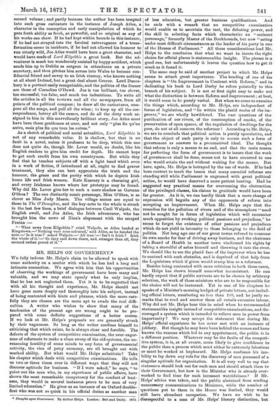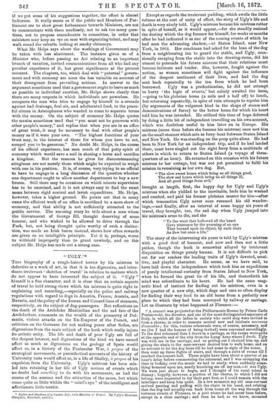MR. HELPS ON GOVERNMENT.* WE fully indorse Mr. Helps's claim
to be allowed to speak with some authority on a matter with which he has had a long and intimate connection. We agree with him that his opportunities of observing the workings of government have been many and valuable, and we may state openly what he only implies, that he has not neglected them. Yet it is to be regretted that with all his thought and experience, Mr. Helps should not have gone more deeply and thoroughly into his subject, instead of being contented with hints and phrases, which the more care- fully they are chosen are the more apt to evade the real diffi- culties. A writer who wishes to show that many of the tendencies of the present age are wrong ought to be pre- pared with some definite suggestions of a better course. If we look at Mr. Helps's proposals we are generally struck by their vagueness. So long as the writer confines himself to criticizing that which exists, he is always clear and forcible. The defects of the system of competitive examination, the over-eager- ness of reformers to make a clean sweep of the old systems, the un- reasoning hostility of some minds to any form of governmental activity, the vice of petty economy, are all brought out with marked ability. But what would Mr. Helps substitute? Take his chapter which deals with competitive examinations. He tells us two or three times over in different ways that they will not discover aptitude for business. " If I were asked," he says, " to point out the men who, in my experience of public affairs, have shown the most remarkable competency for the conduct of busi- ness, they would in several instances prove to be men of very limited education." He gives us an instance of an Oxford double- first who was not as quick in his official duties as another man
* Thoughts upon Government. By Arthur Helps. London; Bell and Daldy. 1872.
of less education, but greater business qualifications. And he ends with a remark that no competitive examination would enable us to ascertain the tact, the debating power, and the skill in selecting facts which characterize an "eminent personage," formerly Master of the Buckhounds, but now "acting under most difficult circumstances as the leader of his party in one of the Houses of Parliament." All these considerations lead Mr. Helps to the conclusion that what we want to insure the right choice for official places is statesmanlike insight. The phrase is good one, but unfortunately it leaves the question how to get it much as it found it.
The same may be said of another project to which Mr. Helps seems to attach great importance. The heading of one of his chapters is " On Improvement in Contrast with Reform," and in dedicating his book to Lord Derby he refers pointedly to this branch of his subject. It is not at first sight easy to make out what the distinction is between Reform and Improvement ; at best, it would seem to be purely verbal. But when we come to examine the things which, according to Mr. Helps, are independent of forms of legislation, and "lie within the placid realm of the im- prover," we are wholly bewildered. The vast questions of the purification of our rivers, of the consumption of smoke, of the preservation of open spaces, of the regulation of dwellings for the poor, do not at all concern the reformer ! According to Mr. Helps, we are to conclude that political action is purely speculative, and that the object of each party is only to secure such a form of government as answers to a preconceived ideal. The thought that reform is only a means to an end, and that the main reason for perfecting the form of government is to insure that the work of government shall be done, seems not to have occurred to one who would attain the end without waiting for the means. But here, again, Mr. Helps is betrayed by the use of words. If he had been content to teach the lesson that many essential reforms are standing still while Parliament is engrossed with great political action, he would have deserved a more patient hearing. Had he suggested any practical means for overcoming the obstruction of the privileged classes, his claims to gratitude would have been far greater. As it is, we can hardly think that a mere change of expression will beguile any of the opponents of reform into accepting an improvement. When Mr. Helps says that the remedies for the pollution of rivers and of the atmosphere " need not be sought for in forms of legislation which will encounter much opposition by evoking political passions and prejudices," he seems to forget the existence of other passions and prejudices which do not yield in intensity to those belonging to the field of politics. Not long ago one of our great towns refused to consume its own smoke for fear of driving away business, and the chairman of a Board of Health in another town vindicated his rights by taking a shovelful of ashes himself and throwing it into the river. We should like to see the placid face of the improver when he has to contend with such obstacles, and is deprived of that help from the Legislature which if given would stamp him as a reformer.
Besides being contented with mere criticism in both these cases, Mr. Helps has shown himself somewhat inconsistent. He can hardly expect that if public servants are to be chosen by arbitrary selection, the work of those ministers who are to be responsible for- the choice will not be increased. Yet in one of his chapters he speaks of a Minister's morning budget of private letters, not includ- ing official letters, numbering no less than 108, and he justly re- marks that to read and answer them all entails excessive labour. Why did not Mr. Helps bear this in mind when lie recommended statesmanlike insight instead of competitive examinations, and dis- couraged a system which is intended to relieve men in power from importunity ? We may accept the statement that during Mr. Helps' official experience he has never met with an instance of jobbery. But though he may have been behind the scenes and have known the reasons which led to any appointment, the public is in a different position. Whatever may be the faults of the competi- tive system, it is, at all events, more likely to give confidence to. the public than a process which must either be extremely laborious or must be worked at haphazard. Mr. Helps confesses his ina- bility to lay down any rule for the discovery of men possessed of a singular aptitude for organization. It is all very well to say that
statesmen should look out for such men and should attach them to their Government, but how is the Minister who is already over- worked to find time for such incessant watchfulness ? If Mr.
Helps' advice was taken, and the public abstained from sending unnecessary communications to Ministers, while the number of questions put to them in the House was limited, they would still have abundant occupation. We have no wish to be disrespectful to a man of Mr. Helps' literary distinction, bat
if we put some of his suggestions together, the effect is almost ludicrous. It really seems as if the public and Members of Par- liament are to show great forbearance towards Ministers, ,are not to communicate with them needlessly, not to ask too many ques- tions, not to propose amendments in committee, in order that ministers may keep an lye on men with organizing talent, and may walk round the suburbs looking at smoky chimneys.
What Mr. Helps says about the workings of Government may be taken with less abatement. The instance given us of a Minister who, before passing an Act relating to an important branch of taxation, invited communications from all who had any peculiar experience of it, has great significance at the present moment. The chapters, too, which deal with "paternal" govern- ment and with economy are none the less valuable on account of their divergence from prevailing notions. In answer to the argument sometimes used that a government ought to leave as much as possible to individual exertion, Mr. Helps shows clearly that there are many respects in which individuals are powerless. He compares the man who tries to engage by himself in a crusade against bad drainage, foul air, and adulterated food, to the peace- ful citizen in Aristophanes who wanted to come to separate terms with the enemy. On the subject of economy Mr. Helps quotes the maxim sometimes used that " you must not be generous with other people's money," and replies that when you are in an office of great trust, it may be necessary to deal with other people's money as if it were your own. " The highest functions of your trust may, in the interest of those for whom you have to act, compel you to be generous." No doubt Mr. Helps, in the course of his official experience, has seen much of that petty spirit of economy which would save a nail in shoeing a horse and sacrifice a kingdom. But the reasons he gives for discountenancing =stinginess are not merely those which might be expected to weigh with one in his position. It is, of course, very trying to an official to have to engage in a long discussion of the question whether one department ought to allow another department to buy a new =►room. Still there may be occasions on which minute supervision ins to be exercised, and it is not always easy to find the exact mean between rigid control and lavish expenditure. Mr. Helps, however, takes a higher ground. He points out that in many cases the efficient work of an office is sacrificed to a mere show of =economy, and that ability is not sufficiently attracted to the public service. The amusing story he tells about a man whom the Government of George III. thought deserving of some honour, and who wished to be allowed to drive through the Park, but, not being thought quite worthy of such a distinc- tion, was made an Irish baron instead, shows how often rewards -are given on no intelligible principle. Yet it is, perhaps, worse to withhold improperly than to grant unwisely, and on this :subject Mr. Helps has made out a strong case.



































 Previous page
Previous page